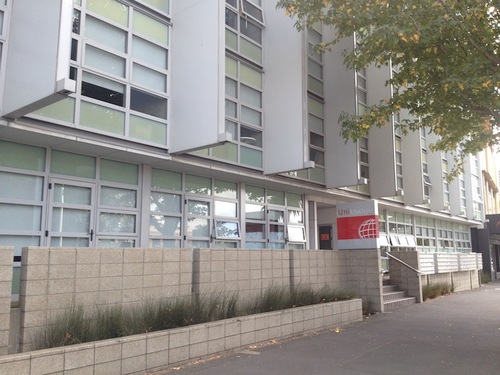Australian student accommodation specialist Jane Hewitt has brought her concept to Auckland, with a development planned to start on Anzac Ave next March, and sees similar growth here after a spectacular four years in Melbourne, Sydney and Brisbane.
Key differences between UniLodge units and straight apartment blacks are the customized furniture – including desk and bookshelves – the pool and student lounge, wiring for Internet access in every unit and “experience management” for youngsters new to coping on their own away from home.
Another factor is promotion of the brand through Asia, a major source of overseas students in Australia and New Zealand. The Auckland project, a short distance from the city’s central university and technology campuses, will be built by Nigel McKenna’s Melview Developments, a company which has averaged construction of more than 200 houses and apartments a year. It is on a former Railways lease-hold site above Beach Rd, previously never built on and now owned by Tramco, which will retain the free-hold. Melview will take a perpectual lease, which puts a discount of about 10 per cent on the $2 million freehold value of the site.
UniLodge will take a 10-year management contract, with a right of renewal, over the 108 units on 17 floors and Kelland’s Nicola Bull is managing sale of the strata titles, which are offering investors a guaranteed eight per cent return for the first two years. There is an acknowledged shortage of student accommodation in Auckland – Auckland University alone gets requests for 1000 beds a year more than the 1570 it can provide now – while there are question marks over the growth rate of city centre living for non-students.
Hewitt was concentrating on hotels and real estate management consulting four years ago when a Sydney education facilities developer, Mark Skinner, approached her with his UniLodge idea. Skinner is now out of the picture, focusing on running private campuses for international students, but Hewitt has carried on to build up a portfolio of four apartment blocks containing 1400 beds. She now has 25 per cent of the business, with Macquarie Bank taking 50 per cent and Walker Corporation (recently taken over by Singapore Government-controlled Australand) holding the other 25 per cent.
Two more lodges are being developed in Australia and within two years the chain will have 4000 beds. Hewitt believes the rate of growth will slow down in Australia, but the scope for growth through New Zealand is strong. She sees herself as a different kind of property developer, conscious that both sides of the equation – residents and investors – need to be managed. McKenna’s developments in Auckland recently have included some of the highest profile, with ownership of the Quays and park-ownership of the adjoining Watermark projects on the Viaduct Basin.
Another of his companies acted as owner’s project manger for the Metropolis and he has the three-stage terraced housing and apartment project under way below UniLodge, on former railway land facing the Strand. McKenna has looked in several of his most recent projects at meeting low-budget targets and has achieved this with UniLodge, although it is designed by prominent architects Warren & Mahoney and it does not include the high ratio of studios which some developments have included.
Studios are fine for short-term residency but not appropriate for a whole year, says McKenna. Including a furniture package worth between $10,000 and $20,000, UniLodge’s prices range from $99,000 to $149,000 for 32.6sqm one-bedroom units, through a range from $185,000 to $215,000 for 53.6sqm two-bedroom units and 70sqm three-bedroom units up to $260,000.
Bull says that on a space comparison these are cheap, averaging $3600 a sqm compared to a city apartment average of $4000. They are also wider, at 6m for a one-bedroom unit, than the typical hotel room style of 4m across in most city one-bedders. Hewitt expects international and post-graduate students to play an important role in filling the building, and for the American interest in studying in the Antipodes to expand here. “American students are becoming more adventurous, looking at taking six or 12-month exchange programmes to get a bit of experience,” Hewitt says.

